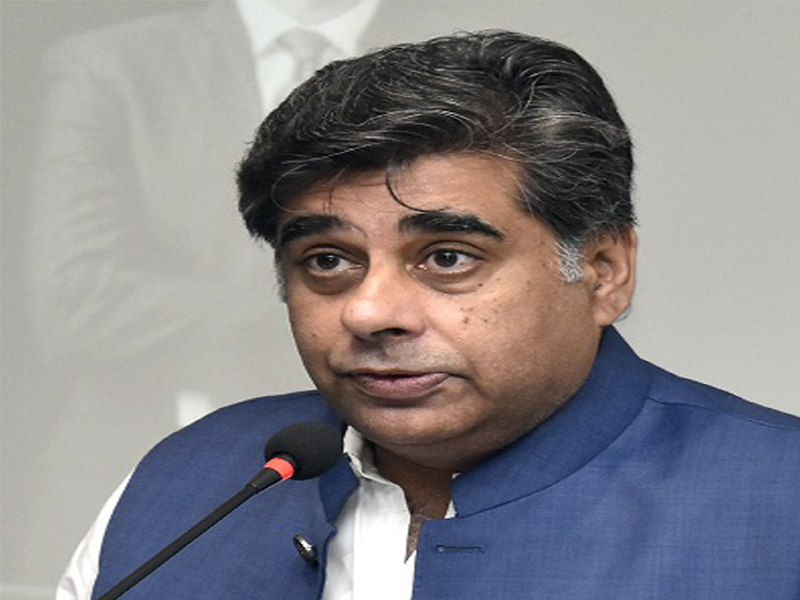Gohar demands further decline in interest rate

- 135
- 0
LAHORE: Gohar Ejaz, the former caretaker Commerce Minister and a prominent figure in the textile industry, has made a compelling case for an urgent reduction in the current interest rate, which stands at 17 percent.
Ejaz describes this rate as unjust and detrimental to the economic recovery of Pakistan, emphasizing that lowering the interest rate by 4 percent could significantly aid in revitalizing the nation’s economy. In a recent statement, Ejaz, who represents the All Pakistan Textile Mills Association (APTMA), stressed the crucial role of the textile sector in the country's economy. Currently, the industry exports goods worth approximately $10 billion. Ejaz highlighted a notable shift in the sourcing of raw materials for the textile sector, revealing that previously 80 percent of the raw materials were imported. However, this figure has now dropped to only 20 percent, indicating a growing self-sufficiency in the industry.The former minister pointed out that economic indicators reveal a concerning trend: when the GDP growth rate reaches 6 percent, the current account deficit tends to soar to $20 billion.
He expressed concern over the sustainability of such growth, especially when it leads to an increasing deficit. Reflecting on the previous year's economic conditions, Ejaz noted that the exchange rate had stabilized at approximately Rs 280, attributing the ongoing inflation to the devaluation of the currency. He believes that stabilizing the currency and addressing inflation are crucial steps towards fostering a healthier economic environment.Ejaz expressed optimism regarding the future of Pakistan's exports, asserting that they could potentially reach $36 billion if the right conditions are met. One of his key proposals involves reducing electricity costs to just 9 cents per unit. He argued that such a reduction could increase exports by an additional $6 billion. His call for a collaborative effort between the government and the export industry is aimed at achieving this ambitious goal, particularly emphasizing the potential contributions of the textile sector alone. In his critique of the energy sector, Ejaz specifically targeted Independent Power Producers (IPPs). He questioned the rationale behind making payments to non-operational units, suggesting that the government should only compensate operational plants. He argued that this policy shift could lower electricity prices to around 8 cents per unit, benefiting both the industry and consumers alike.
Ejaz revealed that five power plants currently receive a staggering Rs 100 billion annually, funds that he believes could be better allocated to enhance operational efficiency and reduce costs. The textile sector has long been regarded as a backbone of Pakistan's economy, employing millions and contributing significantly to the country’s export revenues. However, it has faced numerous challenges in recent years, including rising production costs, fluctuating currency rates, and competition from other textile-producing countries. Ejaz's call for an interest rate reduction and improved energy costs reflects a growing concern among industry leaders about the sustainability of their operations and the overall health of the economy. Ejaz's statements come at a time when many in the business community are calling for government action to support local industries. With inflation rates rising and the cost of living increasing, many citizens are feeling the pinch. The proposed changes could not only bolster the textile sector but also lead to broader economic benefits, including job creation and improved living standards for the workforce. Moreover, Ejaz's vision for the textile industry aligns with the government's goals of boosting exports and reducing the current account deficit. By increasing exports and stabilizing the economy, Pakistan could pave the way for sustainable growth that benefits all sectors of society.
Ejaz's emphasis on collaboration between the government and the export industry is crucial for fostering an environment where businesses can thrive and contribute positively to the economy. As discussions around economic policy continue, it remains to be seen how the government will respond to calls for interest rate reductions and energy cost reforms. The textile industry, with its significant potential for growth, stands at a critical juncture. Leaders like Gohar Ejaz are advocating for necessary changes to ensure that Pakistan's economic landscape becomes more conducive to growth and sustainability. In conclusion, Gohar Ejaz's appeal for a 4 percent reduction in interest rates and his critique of the current energy payment structures highlight the urgent need for reforms within Pakistan's economic framework. His insights serve as a reminder of the critical role that the textile sector plays in the nation's economy and the potential for future growth if the right policies are implemented. The coming months will be crucial as industry leaders and policymakers navigate these challenges in their quest for a more prosperous economic future for Pakistan.

















































